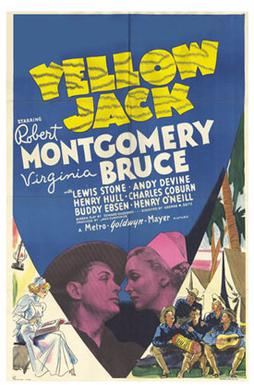Yellow Jack
1938 film by George B. Seitz From Wikipedia, the free encyclopedia
Yellow Jack is a 1938 film released by Metro-Goldwyn-Mayer based on the 1934 play Yellow Jack.[1] Both were co-written by Sidney Howard and Paul de Kruif (the former a Pulitzer- and Oscar-winning playwright and screenwriter; the latter a well-known microbiologist and author).[2]
| Yellow Jack | |
|---|---|
 | |
| Directed by | George B. Seitz |
| Written by | Sidney Howard (play) Paul de Kruif (play collaborator) Edward Chodorov (screenplay) |
| Based on | Yellow Jack by Sidney Howard and Paul de Kruif |
| Produced by | Jack Cummings |
| Starring | Robert Montgomery Virginia Bruce Lewis Stone Sam Levene Andy Devine Henry Hull Charles Coburn Buddy Ebsen |
| Cinematography | Lester White |
| Edited by | Blanche Sewell |
| Music by | William Axt |
| Distributed by | Metro-Goldwyn-Mayer |
Release date |
|
Running time | 83 minutes |
| Country | United States |
| Language | English |
Produced and directed by the legendary Guthrie McClintic, the original Broadway play co-starred James Stewart and Sam Levene and opened at the Martin Beck Theatre, March 6, 1934.[3] Stewart's performance as Sergeant John O'Hara in the Broadway production of Yellow Jack attracted the attention of Hollywood along with a MGM contract. When Yellow Jack was filmed, Stewart was unavailable and replaced by Robert Montgomery. Sam Levene was the only member of the original Broadway cast to also appear in the movie. The supporting cast also features Lewis Stone, Andy Devine, Henry Hull, Charles Coburn and Buddy Ebsen.
Plot
The plot line follows the events of the well-known "Walter Reed Boards", in which Major Walter Reed of the United States Army worked to diagnose and treat yellow fever (called “yellow jack”) in Cuba in 1898–1900. The U.S. Army Medical Corps doctors studied the theory by the Cuban doctor Carlos Finlay that the disease was caused by bites of infected Aedes aegypti mosquitoes, a concept which had been ridiculed. The dramas portrayed the soldiers who volunteered to be human "guinea pigs" by allowing themselves to be bitten and contract the deadly disease, for which no cure was then known. (See History of yellow fever.)[4][5]
Cast
- Robert Montgomery as John O'Hara
- Virginia Bruce as Frances Blake
- Lewis Stone as Major Walter Reed
- Andy Devine as Charlie Spill
- Henry Hull as Dr. Jesse Lazear
- Charles Coburn as Dr. Carlos Finlay
- Buddy Ebsen as 'Jellybeans'
- Henry O'Neill as Dr. William Gorgas
- Janet Beecher as Miss Macdade
- William Henry as Breen
- Alan Curtis as Brinkerhof
- Sam Levene as Busch
- Stanley Ridges as Dr. James Carroll
- Phillip Terry as Ferguson
- Jonathan Hale as Major General Leonard Wood
Tribute to volunteers
The movie ends with the following tribute to the real volunteers of the Yellow Jack experiment: Yellow Jack celebrates what these men did, rather than what they were. That their heroism, however, should not go unrecorded, their true names are here given:
- Robert P. Cooke
- Levi E. Folk
- Warren G. Jernegan
- John R. Kissenger
- John J. Moran
Television adaptations
The play and screenplay were adapted for television by Celanese Theatre (1952) and Producers' Showcase (1955), in episodes titled Yellow Jack.[6][7]
Radio adaptation
Yellow Jack was presented on Philip Morris Playhouse September 5, 1941.[8]
References
External links
Wikiwand - on
Seamless Wikipedia browsing. On steroids.
